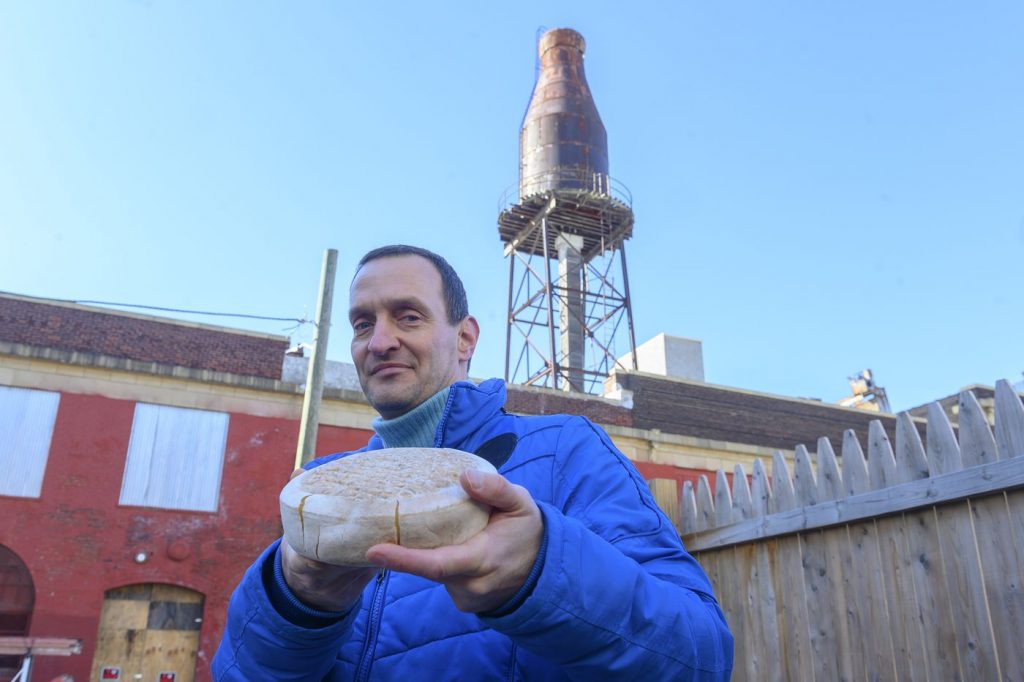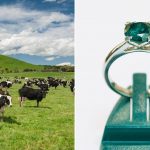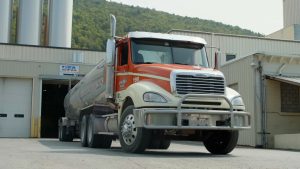
Yoav Perry’s approach to cheese-making manifests the American melting-pot ideal, blending ingredients and techniques from traditional cheeses around the world to create something original: a bloomy rind cheese with enzymes from a thistle, a blue cheese made with red mold.
“Totally crazy stuff you can only do in America,” said Perry, of Fishtown, his words lightly accent-spiked, a remnant of his Israeli upbringing. “Over in Europe, it’s tradition, tradition, tradition.”
Perry, 46, spoke with quiet fervor about cheese, and his hopes to become the latest food manufacturer to bring his craft to a corridor in Kensington and Fishtown that already includes breweries, coffee companies, and distilleries.
“There’s sort of a maker’s corridor that’s happening here,” he said. “It’s almost turning into a little Brooklyn,” an artisanal food mecca.
Perrystead Dairy, his first foray into solo cheese production after working as a consultant in the industry for years, received a $126,039 state grant last month that will cover about 85% of the cost of building a creamery to convert milk to cheese. He still needs start-up capital, but wants to produce two cheeses a season, eight annually, starting as soon as this year. He anticipates needing a small workforce, just a few people initially, but hopes to double capacity in his second year.
Perrystead Dairy is expected to process 5,000 pounds of milk weekly, from dairies in Lancaster, Montgomery, and Bucks Counties, according to Perry’s grant application. His interest in buying from local farms allowed him to tap into the $5 million-a-year Pennsylvania Dairy Investment Program, which helps farmers shift to making and selling milk products. State Sen. Lawrence Farnese (D., Philadelphia) sponsored Perry’s application because the Philadelphia cheese maker would become a new customer for dairy farmers, who’ve struggled with sinking milk prices and the rising popularity of alternatives such as almond and soy milk.
“The aim of that program was to turn milk into products more valuable than gallons and half-gallons,” Farnese said.
In 2012, Pennsylvania had 7,829 dairy farms. By the beginning of 2019, there were about 1,630 fewer, said Mark O’Neill, spokesperson for the Pennsylvania Farm Bureau, an industry advocacy organization. Once the fourth-largest dairy-producing state in the country, it is now the seventh.
Among the surviving farms, many have remained in operation by switching to products that don’t come from cow udders. “They have to find new ways to diversify in order to bring in money to stay in farming,” O’Neill said.
During a recent interview, Perry stood in front of Kensington’s most recognizable landmark, a 30,000-gallon steel milk bottle rusting on its high perch alongside the elevated Market-Frankford tracks. He had hoped to find a home for his business in the old Harbison’s Dairy complex — dating to 1895 and now being converted to apartments and commercial space — but a lease negotiation has stalled. He is committed to basing Perrystead Dairy in the neighborhood, though.
“That’s my neighborhood,” he said, “and the whole point is to bring back economic development to my neighborhood.”
Perry moved to Philadelphia four years ago from New York City, where he couldn’t imagine starting a similar business.
In Kensington, he said, “there are warehouses, the price is good. Everything we need is here.”
Its monthly commercial rental rates for 5,000- to 20,000-square-foot industrial spaces average 93 cents a square foot, according to the market tracking firm CoStar. Similar industrial spaces throughout Brooklyn average $1.96 per square foot, and almost $3 in a hot neighborhood such as Williamsburg.
Kensington’s renaissance began about 20 years ago, when manufacturers and restaurants began taking advantage of the building stock left from an earlier era of thriving businesses.
“A dairy, textile mills. … One of the buildings in that area was a manufacturer of fish tanks,” said Kae Anderson, director of economic development for the New Kensington Community Development Corporation. “Each of these buildings has a very unique story to it.”
One of the first of the new producers was the Philadelphia Brewing Co., which opened in 2001 in a defunct 19th-century brewery, Anderson said. There are now 11 wholesale or distribution food businesses in the area, and eight breweries or distilleries, according to Anderson.
Small businesses need many of the same features as larger manufacturers, such as loading docks and transportation access, she said. The industrial buildings in Fishtown and Kensington offer lots of space, existing infrastructure to receive deliveries and ship product, and access to both I-95 and public transit.
“It puts us in a prime location,” Anderson said.
The influx of food and drink producers has continued to expand north, to Port Richmond and Harrowgate.
Around Harbison’s, laborers renovating the building are just one crew among several at work on the block. Next door to the old dairy, apartments are nearly complete.
“We’re two blocks from the Berks Station,” said Doug Jordan, president of Southwood Properties, an owner of the Harbison building. “Your access to Center City is tremendous. It’s a 16-minute ride once you’re on at Berks to City Hall.”
Perry came to cheese as a hobby, he said. While living in New York City, he worked in the tech industry but loved cooking and found the reception to his homemade cheeses so positive that he switched careers. In the last decade, he has owned a company that sold cheese-making tools and ingredients, made a cheese that was on the menu of the tony New York restaurant Eleven Madison Park, and done consulting for cheese producers.
His enthusiasm for his craft is clear, and he has strong opinions on whether he should be called a fromager or a cheese maker. He prefers the latter. The former isn’t entirely accurate, because it connotes a cheese merchant, not a creator, he said, and besides, using a word of French origin seems to be a way to borrow prestige from France’s cheese-making culture, rather than respect America’s own success story.
Selling high-end cheeses, he said, is his chance to put a personal, particularly American stamp on a craft he loves.
“My expertise is doing stuff that is really out there,” he said. “It is going to be delicious.”























